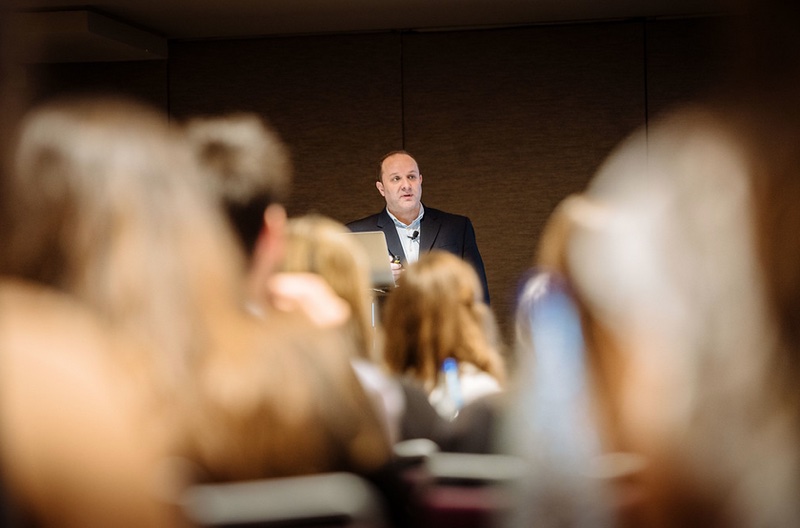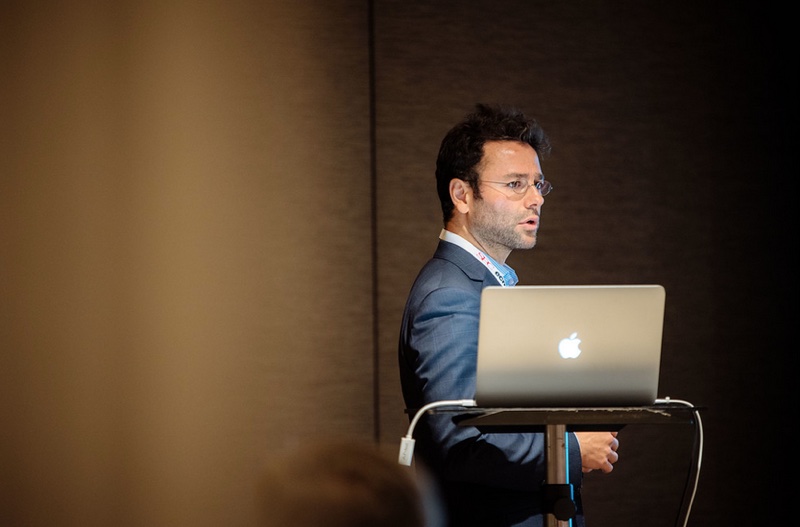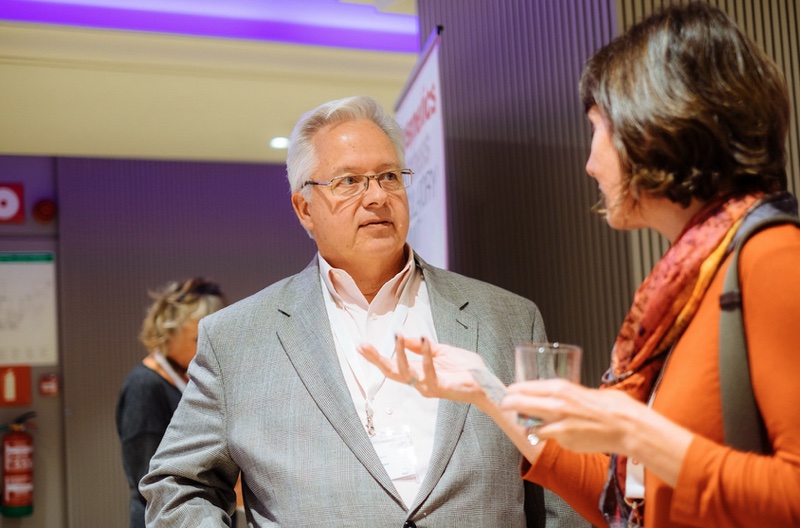The safety of consumers is one of the biggest responsibilities that cosmetics companies face.
From product development to registration, marketing and beyond, regulatory requirements are often subject to legislative changes and updates – and keeping on top of these can be a major challenge.
Navigating the regulatory field was the focus of the recent Cosmetics Business Regulatory Summit, held in Barcelona, Spain, from 16-19 October.
More than 100 cosmetics regulatory professionals gathered at the Crowne Plaza for the two-day event, with delegates hailing from 15 countries including Dubai, Australia, Switzerland and South Africa.
Ken Bubeck, CEO of Ithos Global, Inc., said: "My entire team found the Cosmetic Business Regulatory Summit to be an excellent event.
"The programme was full of applicable information and captured everyone's attention, while delivering a high level of quality and substance. The delegates fully enjoyed the programme due to the strong technical knowledge of the speakers."
An open forum for discussion

Presenting in concise 40-minute sessions, 15 speakers addressed topics spanning ingredients regulation, trends and marketing, and specific country requirements, catering for specialists and regulatory newcomers alike.
Lucy Tandon Copp, Editor of Cosmetics Business, said: “When it comes to cosmetics regulation, confidence is key. The scope and complexity of global regulations can seem daunting – it’s easy to bury your head in the sand. But that isn’t safe for your business or those you serve.
“That’s where the Regulatory Summit comes in. In compact time-slots, expert speakers gave easy to follow presentations with a focus on practical advice. Every talk ended with questions from the audience.
"It was great to see so many delegates proactively seeking solutions for their individual businesses and sharing their own perspectives during the panel discussions.”
Tackling everyday regulatory questions:
What ingredients regulatory changes matter in 2017?

Dr Artur Puig from Revlon and Elizabeth Arden provides an update on EU ingredients regulations
Dr. Artur Puig, Senior Director EMEA Regulatory Affairs & Product Safety, Revlon and Elizabeth Arden, provided an update on changes to EU ingredients regulation in 2017. He focused on five new regulations that came out this year and the arrival of the Omnibus Act under Annexe II.
Ina Höfgen-Müller, Merck Group’s Director of Regulatory Affairs Europe, spoke on regulatory developments affecting nanoparticles in the EU, discussing the European Commission catalogue of 43 substances published in June.
Ian Watt, European Product Stewardship and Regulatory Manger, from Dow Chemical Company, explored the trend for free-from products. He highlighted how ‘non-traditional’ preservatives are gaining popularity as consumers seek more natural products. He said there is a need for dialogue with the Commission and SCCS, as well as Cosmetics Europe, and education of consumers and stakeholders on the benefits and need for preservatives.
Christine Oleschkewitz, Senior Expert Regulatory Marketing, at Schülke & Mayr, focused on preservatives and how the popularity of free-from products is impacting options available to formulators. She started with the basics on preservative definition under Annex V of the EU Cosmetic Product Regulation 1223/2009 and drew on Mintel data to reveal the Top 10 preservatives.
How do I enter new markets?

Hajir Hakim Hashemi talks about the Iranian market
Hajir Hakim Hashemi, CEO of Laboratoires Dermeden, provided practical advice on entry into Iran, following the lifting of sanctions this year. Describing the country as ‘a la mode’, he took a look back at the country’s history and provided a market entry checklist.
Ariadne Morais, Regulatory Affairs Manager Brazil and LatAm Regulatory Policy Leader at Johnson & Johnson, shared her insight into entering the Latin American region. She discussed the importance of abiding by each country’s individual entry requirements and pointed delegates towards the regional trade association CASIC.
Alexandra Egan, Global Regulatory Analysis Manager at Oriflame, talked about how to enter China. She explained the difference between non-special and special products, and provided a timeline for entry. She also highlighted the option of manufacturing locally in order to bypass the country’s strict animal testing regulations.
Nick Jermstad, Manager, Toxicology and Environmental Assessments at Intertek, discussed the entry requirements for the US and Canada. He spoke about the differences between over-the-counter drugs compared with the rest of world, and talked through the FDA’s voluntary registration system, which he encouraged delegates to participate in. He said that if you can sell your product in the US, it is highly likely to be compliant in Canada, the key difference being registration through Health Canada.
What about regulations affecting my finished product?

Megan Parfitt networks after her talk on compliance following the CPNP notification
Megan Parfitt, Managing Director of Connect Compliance, provided an overview using three real-life case studies about the role of the Responsible Person and their relationship with the Distributor. She encouraged delegates to understand their roles and responsibilities, and connect with their local authority bodies.
Raphael Sauerwein, VP Legal & Regulatory Affairs at KTN Dr. Neuberger, discussed how cosmetic marketing claims can be substantiated under Article 20. He shared his ‘six commandments of claims’, which include: legal compliance, truthfulness, evidential support, honesty, fairness and informed decision making.
Giulio Pirotta, Technical and Scientific Director of the Italian Society of Cosmetics Chemists, explained the importance of knowing how to classify your product. He used examples such as dental floss, chewing gum and even toys to illustrate how products can face classification issues. He directed delegates to the European Commission website where there is a comprehensive section on borderline cosmetics.
Katie Vickery, International Regulatory and Compliance Partner at law firm Osbourne Clarke, shared her crisis management advice, including a simple to follow plan for crisis teams. She emphasised the importance of appointing a crisis project name in order to track activity after a crisis hits.
How should I organise my regulatory processes?

Ken Bubeck covered the benefits of automated regulatory processes
Ken Bubeck from Ithos Global gave an overview of how his company can help cosmetics businesses structure their regulatory processes digitally. He said: “We believe regulatory knowledge and having that information at your fingertips, allows you to take a strategic approach.”
He ran through the five ‘stage-gates’ of regulatory processes including ideation, product development, formulation development, planning and production, and product release, all manageable using Ithos’ system.
A regulatory advisory panel was held featuring Bubeck, Morais and Sauerwein, and chaired by Richard Hesk from Cosmetics Business. The panel questioned how other departments can support regulatory teams in order to ensure streamlined compliance across the board.
The panel discussed how communication and training is essential to managing cross-functional groups, and how regulation teams might benefit from re-defining and re-shaping their internal image.
What are the regulations of the future?

Iñigo Larraya Tejero, CSR & Sustainability Director Spain, L’Oréal, shared his company’s experience of self-regulation around the trend for sustainability in beauty.
He explained the targets and metrics used to measure progress and impact, and the steps taken to achieve them. He went on to discuss how other companies can implement these plans, and expressed that, in general, companies are moving much faster than government on sustainability, adding that anyone who adopts a sustainable strategy now will put them at an advantage.
A roundtable discussion was held on Brexit, featuring Parfitt, Egan and Vickery on a panel chaired by Stanpa’s Susanna Arranz. The panelists gave their points of view on how the UK’s EU referendum was received by their company and what action or plans have been put in place since.
All agreed that lack of clarity was still keeping companies back from effectively forward planning, as the UK continues to remain largely in the dark about the day-to-day effects of leaving the EU. The consensus was that businesses are starting to get fed up of uncertainty; only one delegate said they were making solid plans in anticipation of Brexit.
